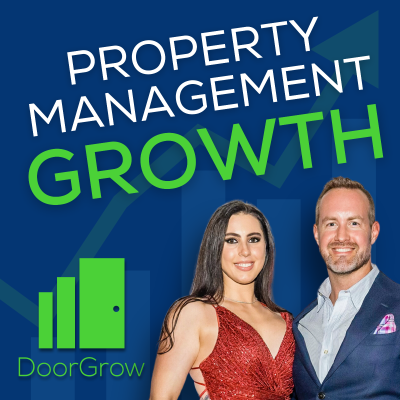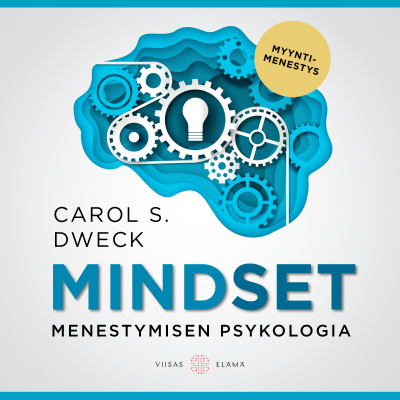
Property Management Growth with DoorGrow
englanti
Talous & ura
7 vrk ilmainen kokeilu
Kokeilun jälkeen 7,99 € / kuukausi.Peru milloin tahansa.
- Podimon podcastit
- Lataa offline-käyttöön
Lisää Property Management Growth with DoorGrow
🚀 Struggling to grow your property management business? 🔥 Need more doors but feel stuck? ⚙️ Operations a mess? Welcome to Property Management Growth with DoorGrow! This is THE podcast for property managers who want to scale faster, add more doors, and systemize their operations—without the B.S. Hosted by Jason Hull, marketing expert, entrepreneur coach, and property management growth strategist, we bring you the best strategies, insights, and hacks to help you dominate your market. Learn from top property managers, industry experts, and vendors sharing real-world tactics that actually work. ✅ How to attract more property owners ✅ Fixing broken operations & streamlining processes ✅ Marketing & sales strategies that get you more doors ✅ Eliminating stress & scaling efficiently Join our free community of growth-focused property managers at DoorGrowClub.com and get the best property management marketing & growth strategies at DoorGrow.com. 🎧 Subscribe now and start growing your business today!
Kaikki jaksot
321 jaksotDGS 321: The Property Manager's Contract Playbook - Lessons from the Field
When creating your property management and lease agreements, there may be crucial pieces of information you are missing that could proactively protect you and your team… In this episode of the #DoorGrowShow, property management growth expert Jason Hull sits down with Tim Baldwin from Property Management Law Solutions to talk about proactive strategies like scheduled inspections, maintenance plans, helping landlords stay ahead of costly problems, avoiding crisis mode, ensuring long-term property health, and more. You'll Learn [3:06] Creating Effective Property Management Agreements [8:34] Mold Addendums, Resident Benefits Packages, & More [12:44] Building Efficient Property Management Systems Quotables "A lot of property management business owners view these contracts as just a protection that happens once you're legally at war with somebody. Instead of a proactive preemptive measure." "A lot of times it doesn't even matter what is written in the contract, it matters what they think is in the contract, the tenant or the owner." "We don't want to just be adding more bells and whistles and services if it's not actually going to be a profit center." Resources DoorGrow and Scale Mastermind [https://www.doorgrowacademy.com/courses/mastermind] DoorGrow Academy [https://www.doorgrowacademy.com/] DoorGrow on YouTube [https://www.youtube.com/channel/UCC1mGYT2Sw0LOe32hO_QdNg/featured] DoorGrowClub [https://doorgrow.com/] DoorGrowLive [https://doorgrowlive.com/] Transcript Tim Baldwin (00:00) property management companies need to make sure that both of those agreements really take their business from the beginning of how they operate to at the end of the tenancy and even the move out process and what governs those relationships. Jason Hull (00:00) sure, property management companies need to make sure that both of those agreements really take their business from the beginning of how they operate to the end of the tenancy and even the move out process and what governs those All right, I am Jason Hull, the founder and CEO of DoorGrow, the world's leading and most comprehensive coaching and consulting firm for long-term residential property management entrepreneurs. For over a decade and a half, we have brought innovative strategies and optimization to the property management industry. We talked to thousands of property management business owners. We've coached hundreds. helping them figure out how to grow their business. And at DoorGrow, we believe good property managers can change the world and that property management is the ultimate high trust gateway to real estate deals, relationships, and residual income. We are on a mission to transform property management business owners and their businesses. We want to transform the industry, eliminate the BS, build awareness, change perception, expand the market, and help the best property management entrepreneurs win. Now, let's get into the show. So today, I'm hanging out with Tim Baldwin, welcome Tim. Thank you, Jason. And Tim is with a company called Property Management Law Solutions. So Tim, give the audience a little bit of background about you and how you kind of got connected to property management, how you kind of started into entrepreneurism. Give us a little bit of your journey. Yeah. Tim Baldwin (01:05) Thank you, Jason. Yeah, so I am an attorney in Florida. I've been licensed to practice law for almost 22 years. I started out as a prosecutor when I was just out of law school. And then in 2006, I started my own practice. And when I did that, I wanted to enter into an area of law that really there weren't a lot of attorneys practicing. And so that led me to property managers, property management itself, and to the landlord business. Jason Hull (01:42) enter Got it. Okay, cool. Yeah. Tim Baldwin (01:54) Since 2006, I really have specialized primarily in this area of law. And so for the past 20 years, I have developed a clientele throughout the state of Florida with my law firm, which is Property Management Law Solutions. And we help landlords, property owners, apartments, and property management companies across the state of Florida. Jason Hull (02:18) And Florida usually is right in line with all the new stuff going on. There's California and Florida. So I'm sure you see some of the new stuff that's probably headed your way from California eventually maybe. Tim Baldwin (02:27) You We're sort of on a different spectrum, I guess you might say in California, but yeah. Jason Hull (02:38) Yeah, yeah, totally. So, okay, well, yeah, I'm really interested in getting into the topic at hand. we're gonna be talking about. proactive strategies like scheduled inspections, maintenance plans, helping landlords stay ahead of costly problems, avoiding crisis mode, ensuring long-term property health, and several other things. There's a lot. So where should we begin? Tim Baldwin (03:06) I think the place to begin really for property managers and landlords is making sure they have the foundations correct. And I think a huge part of that is the lease agreement. The lease agreement is the operations document essentially. And that's where every property manager really should start when it comes to managing property. if you want to head dive into that, I'd be glad to talk about that topic. Jason Hull (03:12) sure they have the foundations correct. Yeah, let's do it. Tim Baldwin (03:30) Well, like I said, it is the foundational document, just the operational document you have with tenants. And Jason, what I've seen throughout the years is sort of this common theme that landlords, property managers don't quite understand the significance of the lease and how ⁓ to see it as their business document, as their operations document, because that document is what Jason Hull (03:30) Well, like I said, it is the foundational. you know this was seen throughout the years is sort of this common theme that landlords that you know property manager managers I don't quite understand the significance of the lease and how to how to see it as their business document as their operations document because that document is what you know obligates the tenants to act or not act in a certain way. Tim Baldwin (03:58) obligates the tenants to act or not act in a certain way. It gives the landlords the enforcement mechanism to run their business the way that they want to run it, as long as it's in compliance with the statute, of course. And so that part of it is ⁓ just absolutely critical. And it should address all of the various topics and ⁓ parts of the property management business that property managers see Jason Hull (04:03) It gives the landlords the enforcement mechanism to run their business the way that they want to run it as long as it's in compliance with the statute of course. Sure. And so that part of it is just absolutely critical and it should address all of the various topics and parts of the property management business that property managers see not just from a day to day standpoint but also the Tim Baldwin (04:27) not just from a day-to-day standpoint, but also the sort of the more rare instances or the occasions where it are unusual, but yet the lease still addresses those topics. Jason Hull (04:31) So are there more rare instances or the occasions where it are unusual but yet the lease still addresses those topics? Yeah, so Tim, I totally agree with you. One of the challenges I see is that usually when it comes to contracts, lot of property management business owners view these contracts as just a protection that happens once you're legally at war with somebody. Instead of a proactive preemptive measure, of setting boundaries and expectations that can create a healthier relationship. so a lot of times it doesn't even matter what is written in the contract, it matters what they think is in the contract, the tenant or the owner. And so this is why we coach our clients on making sure that you do a review through the entire agreement with them and you use that as, like you're saying, as a document to help change things operationally. You go through with them and explain to the tenant, this is what we expect from you. This is when rents due. This is the consequence. Do you understand this? Because it matters what they understand is in the agreement if you want them to be a better tenant or better owner. Otherwise, the document's really just a tool to go to war with somebody once you're in complete chaos. And there's a major issue. And we don't want to be in those situations. We want agreements. And yes, we want to protect ourselves. Tim Baldwin (05:39) Absolutely. Yeah. Jason Hull (05:52) But even better is if we use it as an onboarding tool. Tim Baldwin (05:56) You know, you're exactly right. mean, the education part of this is critical so that tenants know what to expect and sort of preparing onboarding documents that of course reflect what the lease provides. And sort of in tandem with that is the property management agreement itself. So property managers, knowing what they want in their business, knowing how they're going to operate, you mentioned inspections, know, having the criteria of when it is that you're going to inspect the property. Jason Hull (05:56) Yeah, we are. sort of entanglement with that is Tim Baldwin (06:24) You know, if there's ⁓ additional inspections that may come up, whether it's owner requested or maybe it's an incidental that requires you to go inspect. So the property management agreement is just as important on the owner's side of things. And the lease in the property management agreement need to align with each other because you don't want to obligate yourself sort of on one end with the property management agreement, but then not have those enforcement mechanisms on the tenant side of things within the lease agreement. Jason Hull (06:24) ⁓ You know, there's additional inspections that may come up whether it's only requested or maybe it's an incidental that requires you to go expect so that the property management agreement is just as important important on the owner's side of things and the lease in the property management agreement needs to align with each other because you don't want to obviate yourself sort of on one end with the property management agreement but then not have those enforcement mechanisms on the tenant side of things within the lease agreement. Got it, yeah. So if it's important for the tenant and the owners agreements for them to be able to understand these, how important is it for these documents to be plain language versus legal speak? Tim Baldwin (07:10) Well, I mean, it's hard to get away from some of the legal speak if you want to call it that just because it's just like whenever you go close on a property. mean, you know, probably your audience is very familiar with that. I mean, there's just document after document. know, so it obviously can be put in plain terms, but it's not even so much about whether it's going to put in plain terms versus legalese, but rather which subject matter is going to be addressed. That's the more important part of either one of these agreements, the property management agreement or the lease agreement. And so really, ⁓ landlords out there need to make sure, property management companies need to make sure that both of those agreements really take their business from the beginning of how they operate to at the end of the tenancy and even the move out process and what governs those relationships. Jason Hull (07:37) either one of these agreements, the property management agreement or the lease agreement. so really landlords out there need to make sure, property management companies need to make sure that both of those agreements really take their business from the beginning of how they operate to the end of the tenancy and even the move out process and what governs those relationships. Got it. So if they've got these really great agreements in place, hopefully maybe the language is easy enough for them to be able to read it and understand it a bit so it's not super thick like some of the business stuff I've signed in the past. And then, and it's got like all these proactive things like inspections, rent increases are built in and some of these things that it prevents later problems and later challenges. so they don't run into these scenarios where now it's a battle or someone's upset or there's a new negotiation that has to happen. What are some of the most critical things that you're seeing that people need to be putting into these agreements? Tim Baldwin (08:40) Well, aside from just what you might consider to be the typical areas of interest in a lease agreement, what we're seeing a lot nowadays and really for the past few years, a really significant increase in tenant complaints with regard to mold. It's a really, really hot issue. And so having a mold addendum that really... provides the nuts and bolts of what is the obligation of the landlord and the tenant when it comes to a claim for mold. ⁓ It's kind of a fact I just did a podcast or a seminar, mean, a seminar on this ⁓ last week ⁓ on this issue. And because really this is a topic that for years attorneys did not, I don't think even myself included, didn't really properly... Jason Hull (09:02) I when it comes to a claim for more. It's kind of that type of just need a podcast or a seminar, mean a seminar on this last week on this issue. And because really this is a topic that for years, attorneys did not, don't think even myself included, didn't really properly address to the fullest. But since we see it so regularly now, we have a motor venom that provides for what the... Tim Baldwin (09:27) addressed to the fullest. But since we see it so regularly now, you know, we have a molded end of that provides for what the parties are to do in that event. So that's, that's a really big one. You mentioned maintenance. That's another big win ⁓ to where landlords need to be able to put some of the minor maintenance obligations on tenants because what is what's happening. And I'm sure your audience has experienced this before. Jason Hull (09:37) to in that event. So that's a really big one. You mentioned maintenance. That's another big one to where landlords need to be able to put some of the minor maintenance obligations on tenants because what's happening, and I'm sure your audience has experienced this before, is that the tenants expect the landlords to just do everything, mean, down to changing out a light bulb. So if those things are not addressed in the lease, the landlords can really... Tim Baldwin (09:54) is that the tenants expect the landlords to just do everything. I down to changing out a light bulb. And so if those things are not addressed in the lease, the landlords can really find themselves spinning their wheels and just having a hard time with informing the tenants, no, this is your responsibility. But if they can't point to it in a lease, it becomes problematic for the landlord. So those are two big issues that we see a whole lot. Jason Hull (10:05) So just making sure there's really strong clarity related to maintenance, clarity related to mold. Mold's got to be a big issue in Florida. You guys have crazy humidity there. ⁓ Tim Baldwin (10:31) Yeah. Yeah. Jason Hull (10:34) Not as big a deal in California, Tim Baldwin (10:34) It is. Jason Hull (10:35) which is pretty dry, but yeah, still an issue. Anything else that you're seeing? What about maybe like, there's been a lot of push in the last several years for resident benefits packages and putting some additional fees onto the tenants? Tim Baldwin (10:52) Yeah, yeah, the revenue stream is very important, of course, for property management companies and they're trying to figure out ways of creating those additional revenue centers. And one of them is, of course, tenant benefit packages. There's a variety of vendors that try to sort of pull those together into one package so that whatever it is that they're providing to the tenants, you can sort of get it all in one place. Some property management companies are creating sort of ⁓ Jason Hull (11:07) Mm-hmm. whatever it is that they're providing to the tenants, you can sort of keep it all in one place. Some popular companies are creating ⁓ Tim Baldwin (11:21) those incidentals on their own, whether it's insurance coverage, certain amenities, credit building, Jason Hull (11:21) those incidentals on their own. Whether it's insurance coverage, I'm sorry. ⁓ Filters. Yeah, credit building. Yeah. Tim Baldwin (11:35) online portals, and these types of things. sort of this bulk. And then, of course, you've got to price it out correctly to make sure you're not losing money. Jason Hull (11:37) these types of things are sort of this ball. And then of course you gotta price it out correctly to make sure you're not losing money. Tim Baldwin (11:44) Another thing that ⁓ is fairly common and popular nowadays is sort of having these legal services, not legal services, but they're helping to reduce the cost of legal expenses in the event you have an eviction, covering costs or if you want to cover rent that the tenant hasn't paid up to Jason Hull (11:45) Another thing that is fairly common in popular nowadays is sort of having these legal service, they're not legal services, but they're helping to reduce the cost of legal expenses and eventually have an addiction covering costs or if you wanna cover rent that the tenant hasn't paid. Tim Baldwin (12:05) a certain amount. There's all these types of things that are ⁓ becoming more more popular, but as I... Jason Hull (12:06) up to a certain amount, know, all these types of things that are becoming more more popular. as I say to everybody that comes to me in this regard, you really got to make sure you're punching the numbers properly. You don't want to be losing money. And sometimes it has to do with how many properties you manage because you can leverage the numbers to create a bigger and better benefit for the tenants as well as for the property owners. Tim Baldwin (12:13) say to every client that comes to me in this regard, you really got to make sure you're crunching the numbers properly. You don't want to be losing money and sometimes it has to do with how many properties you manage because you can leverage the numbers to create a bigger and better benefit for the tenants as well as for the property owners. Jason Hull (12:34) Yeah, that makes sense. Obviously, we don't want to just be adding more more bells and whistles and services if it's not actually going to be a profit center, if we're going to be losing money. Cool. So now you mentioned, you know, in preparation for this, you know, it says, Tim will also discuss how consistency, documentation, structured maintenance routines. Tim Baldwin (12:43) Exactly. Jason Hull (12:55) not only prevent maintenance, like prevent emergencies, but also build lasting value and trust with tenants. And so let's get into that a little bit. Tim Baldwin (13:03) Yeah, well everything that the property manager does really needs to be mapped out. Again, starting from the very beginning of creating this tenancy all the way through to the end of it is that the property managers need to know, you know, here's what I'm going to inspect. These are the services that we're going to provide. This is how we're going to process towards end of the lease processes. For an example, requiring tenants who are already placed Jason Hull (13:04) Yeah, who are already placed to apply again to make sure that they still qualify to renew that lease. So having all of these touchstones, if you will, throughout the tenancy, those things really need to be mapped out in advance, put into your calendar, having the proper forms that relate to whatever it is that you're doing so you can notify the tenant, hey, this is coming up, or hey, we're going to be here doing this, or hey, the end of your lease is coming up. Tim Baldwin (13:28) to apply again, to make sure that they still qualify to renew that lease. So having all of these touchstones, if you will, throughout the tenancy, those things really need to be mapped out in advance, put into your calendar, having the proper forms that relate to whatever it is that you're doing so you can notify the tenant, hey, this is coming up, or hey, we're gonna be here doing this, ⁓ or hey, the end of your lease is coming up, we need to know what you're going to do. ⁓ Jason Hull (13:55) We need to know what you're going to do. Tim Baldwin (13:58) It really is, ⁓ the structure itself helps to reduce the amount of wasted time. It sort of seems oxymoronic to say, if I put more effort into the management, into the steps of the process, that's gonna take time. But in reality, when you make it a system and these things become automatic, and that it becomes part of what your team does on Jason Hull (13:58) it really is the structure itself helps to reduce the amount of wasted time. It sort of seems oxymoronic to say, if I put more effort into the management, into the steps of the process, that's going to take time. But in reality, when you make it a system, these things become automatic in that it becomes part of what your team does. Tim Baldwin (14:22) the routine, it does reduce a lot of time with confusion. Jason Hull (14:22) on the routine, does reduce a lot of time with confusion, Tim Baldwin (14:27) know, miscommunication, missing things that you should have caught, and then making sure that you know which tenants should be renewed and which ones shouldn't be renewed. So all these things work together to make management a more efficient system. Jason Hull (14:27) miscommunication, missing things that you should have caught, and then making sure that you know which tenants should be renewed and which ones shouldn't be renewed. So all these things work together to make management a more efficient system. Got it. So a lot of property managers probably initially tried to do everything themselves. That's like what entrepreneurs do. They're like, I'll figure it out. Tim Baldwin (14:48) Yeah. Yeah. Yeah. Jason Hull (14:51) I'll go ask AI, I'll go watch some YouTube videos. I don't know if I need a lawyer. I don't know. And they try and figure this stuff out themselves. What are some of the challenges that you see that kind of reveal to you why your business exists? Obviously your business exists to solve some real problems. So why would they need PM Law Solutions? Tim Baldwin (15:14) Well, it's kind of like what you're doing in the sense that when you have a service that's servicing a need for property managers, you're the professional, you have the training, you have the experience, you have the knowledge to help managers deal with really what they shouldn't have to be dealing with on the day to day. So from my standpoint, of course, property managers are not lawyers. Well, it's more than just law. Jason Hull (15:38) It's more than just law. It's seeing the big picture, it's seeing the full scope of how you get from point A to point Z seamlessly, efficiently, with productivity. And so having the professionals to help you streamline what you're doing, make sure you're doing it properly, make sure you're doing it to reduce the risks of liability is all part of what a professional should be helping you with, whether it's an attorney or even somebody like yourself who says, you want to grow? Tim Baldwin (15:39) It's seeing the big picture, it's seeing the full scope of how you get from point A to point Z seamlessly, efficiently, with productivity. And so having the professionals to help you streamline what you're doing, make sure you're doing it properly, make sure you're doing it to reduce the risks of liability ⁓ is all part of what a professional should be helping you with, whether it's an attorney or even somebody like yourself who says, hey, you want to grow? you want more business, you want to be able to do it with more profit, then these are the steps you need to be taking. So any professional that's servicing that kind of a company, first of all, they should have something that they're providing that is the benefit and it has the value that they're paying for that service. Jason Hull (16:08) you want more business, you want to be able to do it for a profit, and these are the steps you need to be taking. So any professional that's servicing that kind of a company, first of all, they should have something that they're providing that is the benefit and it has the value that they're paying for that service. So what are some of the, I'd love you to tell the audience a little bit about property management law solutions and why they should maybe entertain a conversation with you. why your company might be beneficial, how you could help them with some of the stuff we've been chatting about. Tell us a little bit about the business. Tim Baldwin (16:44) Yeah, well, this is our specialty. So everything that we do in this office is designed to help landlords, property owners in their rental business. We do some other things as well, real estate related, but the bulk of what we do is helping property management companies and landlords. so, ⁓ you know, again, it's setting up your system and your business correctly. It's getting those foundational documents. Also, you're getting sort of that library of resources and knowledge that you need. Jason Hull (16:58) And so, ⁓ you know, again, sort of that library of resources and knowledge that you need, the training and education so that you're ⁓ managing properties the proper way. And so we can spot issues anytime you run into a situation where, hey, what do I do? This is what the tenant is saying. I'm not sure, you know, what is my standing here? What is my position here? How do I reduce my risk of liability? That's what an attorney who specializes in this area can help them do. Tim Baldwin (17:10) the training and education so that you're ⁓ managing properties the proper way. And so ⁓ we can spot issues anytime you run into a situation to where, what do I do? This is what the tenant is saying. I'm not sure. You know, what is my standing here? What is my position here? How do I reduce my risk of liability? That's what an attorney who specializes in this area can help them do. Not to mention help them with, again, the streamlining aspect of what they do because Jason Hull (17:35) not to mention help them with the streamlining aspect of what they do because property management business itself as you well know Jason is one that you have to really work on those margins to make sure that you're making a profit. So when you're wasting time and you're spending money unnecessarily it really can eat into that profit margin. So property management companies have us on retainer. Tim Baldwin (17:40) Property management, the property management business itself, as you well know, Jason, is one that you have to really work on those margins to make sure that you're making a profit. And so when you're wasting time and you're spending money unnecessarily, it really can eat into that profit margin. So property management companies ⁓ have us on retainer to really help them make sure that they're doing business the right way in that regard. We help them with ⁓ drafting those documents they need. Jason Hull (18:02) to really help them make sure that they're doing business the right way in that regard. We help them with drafting those documents they Tim Baldwin (18:09) with giving that legal advice. If they ever do have a legal contest or dispute in some way, we step in to help resolve it quickly, to try to avoid litigation, to resolve matters before they get out of hand. So having a law firm really help you at the beginning of things and earlier on tends to really help them save a lot of money and a lot of waste Jason Hull (18:09) need, with giving that legal advice. If they ever do have a legal contest or dispute in some way, we step in and help resolve it quickly to try to avoid litigation, to resolve matters before they get out of hand. So having a law firm really help you at the beginning of things and earlier on tends to really help them save a lot of money. Tim Baldwin (18:32) of time. Jason Hull (18:32) Got it. Yeah. Yeah. Prevents a lot of major problems and major headaches later that could be very costly in terms of time and money. Got it. Cool. Well, Tim, I appreciate you coming here and hanging out with us on the DoorGrow show. Real quick word from our sponsor. This episode is brought to you by KRS SmartBooks, the bookkeeping team, property manager's trust when they're serious about growth. So listen, the holidays are busy enough. Tim Baldwin (18:38) Yeah, absolutely. Jason Hull (18:55) The last thing you need heading into January is another month of messy books, trust accounts that might be off, or owners blowing up your inbox asking why their statements don't make sense. KRS SmartBooks fixes that. They specialize in property management, accounting and app folio, building and yardie, propertyware and more. They make sure your financials are clean, compliant and ready for growth so you can focus on scaling your portfolio. And here's your end of year win. If you enroll before December 31st, you'll get 30 % off your first month of bookkeeping. That's real savings and a real chance to start the new year with clarity instead of chaos. Visit krsbooks.com and mention DoorGrow on your intake form to unlock your discount. So, in final words, like in wrapping up, what would you like to say to all the property management business owners out there that are maybe relevant to your business, you only deal with Florida, correct? For now. For now, okay. Okay, so if they're Florida property manager, if they're not a Florida property manager currently, where would you send people? Like how do they find somebody that's gonna be a good resource similar to you in another state? Well, the association is... Tim Baldwin (19:44) For now, we are expanding outside of Florida, but yes. Well, the associations, ⁓ apartment associations, residential property management association may have some referrals in that way. And so I would probably start there. You can look at the bar association websites in those states to see if there are attorneys who hold themselves out as experts or specialists in that area of law. Those are two common ways of doing it. Obviously you could do a Google search, but trying to find someone. Jason Hull (20:11) Okay. and hold. you can do Google search but trying to find someone and I would encourage your audience to find the right law firm that fits the way you like to do business, who fits your personality, that you can easily communicate with, that you're able to get in contact with them in fairly short order. Those are critical components of having a landlord attorney because in that business things can happen and do happen. Tim Baldwin (20:27) I would encourage your audience to find the right law firm that fits the way you like to do business, who fits your personality, that you can easily communicate with, that you're able to get in contact with them in fairly short order. Those are critical components of having a landlord attorney because in that business, things can happen and do happen very quickly and so having a timely response is important. So you might reach out to other companies or other landlords that you know in your network, start asking for referrals, do an interview, contact the law firm, ask them if you can talk to them about what they can provide to you, what their cost is, obviously, and see if that is a good fit for you. Jason Hull (21:13) Got it. So if they're in Florida, how do they get in touch with you? Tim Baldwin (21:18) Several ways they can look us up on our website which is PMLawSolutions.com. You can also go to LinkedIn, look at my name, Tim Baldwin, or Property Management Law Solutions. You can find me on LinkedIn. if you want to call our office, you can do that as well at 850-857-2463. Jason Hull (21:31) speak. But if you want to call our office, you can do that as well at 850-857-2463. Perfect. All right, Tim, appreciate you coming out and hanging out here with me here on the DoorGrow show. My pleasure, Jason. Thank you. All right. So for those of you, if you are struggling to figure out how to grow your property management business, we are the best in the world at that here at DoorGrow. Tim Baldwin (21:44) My pleasure, Jason. Thank you. Jason Hull (21:55) Reach out to us. would love to see if we could help and take a look at your business if you want to get to the next level. If you would like a free training on how to get unlimited leads for free, text the word leads to 512-648-4608 and we'll send it to you. Also join our free Facebook community just for property management business owners by going to doorgrowclub.com. And if you would like to get the best ideas in property management, join our newsletter. at doorgrow.com slash subscribe. And if you found this episode even a little bit helpful, don't forget to subscribe and leave us a review on whatever channel you saw this or heard this on. We'd really appreciate it. And until next time, remember the slowest path to growth is to do it alone. So let's grow together. Bye everyone.
DGS 320: (BONUS) The Door Machine - Grow Your Property Management Business
Many property management entrepreneurs who want to grow their businesses do not personally enjoy being a salesperson or BDM (business development manager). If you are in this situation, you might know that you need to hire a BDM… but do you have the resources and time to do so? In this quick episode of the #DoorGrowShow, property management growth experts Jason and Sarah Hull share a sneak peek of the Door Machine™, a program where DoorGrow vets, hires, trains, and supports rockstar property management BDMs to grow your business for you. You'll Learn [1:39] How to Automate Growing Your Property Management Business Resources DoorGrow and Scale Mastermind [https://www.doorgrowacademy.com/courses/mastermind] DoorGrow Academy [https://www.doorgrowacademy.com/] DoorGrow on YouTube [https://www.youtube.com/channel/UCC1mGYT2Sw0LOe32hO_QdNg/featured] DoorGrowClub [https://doorgrow.com/] DoorGrowLive [https://doorgrowlive.com/] Transcript Jason Hull (00:00) All right, what's up everybody? This is Jason Hull and Sarah Hull with the DoorGrow Show. So we're gonna skip the intro today because it is the day after Thanksgiving. It's Black Friday when we're recording this. We do have a Black Friday deal, but you probably already missed out on it, because you probably might not have been paying attention, or if you got it, congratulations. But we do have something in the works we wanted to talk about that I think is gonna be a game changer, really cool. And I'll tell you about it in just a second. But before we do that, Quick word from our sponsor, which is Vendoroo. Many of you tell me maintenance is probably the least enjoyable part of being a property manager and definitely the most time consuming. But what if you could cut that workload by up to 85 %? That's exactly what Vendoroo has achieved. They're cutting edge AI technology to handle nearly all your maintenance tasks from initiating work orders and troubleshooting to coordinating with vendors and reporting. This AI doesn't just automate, it becomes your ideal and learning your preferences and executing tasks flawlessly, never needing a day off and never quitting. This frees you up to focus on critical tasks that really move the needle for your business, whether that's refining operations, expanding your portfolio, or even just taking a well-deserved break. Over half the room at last year's DoorGrow Live conference signed up with Vendero, right then and there. A year later, they're not just satisfied, they're raving. about how Vendoroo has transformed their business. So don't let maintenance drag you down. Step up your property management game with Vendoroo. Visit vendoroo.ai/doorgrow today and make this the last maintenance hire you'll ever need. All right. Let's get into it. So the exciting news that we wanted to talk about is we have this new thing called. Oh, I don't know what we're going it. We're going to call it the DoorGrow Money machine. Door machine. The door, okay, was, the money machine is the same. It's basically a money machine for your business. We're calling it the door machine. Why? Because this is a system that we're installing in your business that brings you money. Basically, we've seen a lot of challenges. People try hiring or struggle to hire a BDM. They try to get, find somebody to do sales for their business and they struggle to keep this person accountable. They struggle to find the right person. we've got the hiring down. So we're placing BDMs into businesses. And sometimes they work out because the business owner is engaged, they support them, they know how to train them and it works out. But sometimes the BDM could be great, but the business owner isn't keeping them accountable. They don't know whether the BDM is doing a good job or not. They just don't know how to best support them or train them. So the challenge is that we wanted to solve is how could we put a BDM into a business, but that BDM is accountable to us. Like we're responsible for them. That BDM has to be paid by us, we figured out. Like if we're gonna control them and get them to do the right things and get them to have the right incentives, the right training, we need to be in control of it because when our clients, a lot of the business owners are in control of these BDMs, they fall short of doing a good job at training them, keeping them accountable, supporting them, et cetera. because you're busy, you have a lot of stuff on your plate. You don't have time to babysit a new BDM. Right. A of yeah. And a lot of times you're getting a BDM because you maybe aren't good at sales or you don't enjoy it. So you trying to train them is kind of like the blind leading the blind. And so we're going to help with this. that's... ⁓ say too much more than that because we're still figuring out the details. We did give a very very sneak preview to one of our clients who before we even got done explaining it he said like eight times he's like I'm in. Yeah just sign me up. sign me Take my money, do it. So he's like yeah I think we're on the right track and it's going to be revolutionary to the industry and the BDM side specifically which I'm really excited about. I'm tired of seeing broke property managers and I'm tired of seeing property managers struggle with hiring. So I think we're just going to step in and fix it. This is the announcement. So by the time you hear this recording or if you see this live, reach out to us and say, hey, I want to hear about the DoorGrow door. What is it? Engine? Machine. DoorGrow door machine. So find out about the door machine. Yeah. money machine, maybe it'll be the money machine. But ask us about the machine, right? And we'll know what you're talking about. And we can let you know the details and I think it'll be pretty exciting. this will be a game changer. It lowers your risk and it helps us make money, you make money, BDM make money. It's a win-win-win for everybody. All right, that's our sneak peek. We are thankful for you all. Thank you for your support. Thank you for... and caring about what we do. Thank you for changing the industry. And I am really excited to do more of that. That's what we're all about here. those of you that are along for the crazy ride in the property management industry, we appreciate it. All right, that's it. Until next time to our mutual growth. Bye everyone.
DGS 319: Protect, Prevent, Perform: Smart Leak Detection for Modern Property Managers
How much money has water damage cost your owners? How much time and money could you save if you were able to detect issues within a property before they became a larger problem? In this episode of the #DoorGrowShow, property management growth expert Jason Hull sits down with Nadav Schnall to explore how innovative water and gas leak detection systems are transforming residential property management and to share how these technologies can prevent costly damage, protect tenants, and streamline maintenance operations for property managers. You'll Learn [1:14] Nadav Schnall's Background in Property Management [05:06] Innovative Solutions for Leak Detection [11:07] Understanding the Technology Behind Pro Sentry [17:25] Implementing Smart Detection Systems Quotables "If something goes unchecked, somebody's out of town, there's a water leak, I mean, it can just do massive damage." "The responsibility of a property manager is to make sure the building is operating properly, to make sure it's operating efficiently, to mitigate damages, to mitigate risks." "Time is of the essence when something like this happens." Resources DoorGrow and Scale Mastermind [https://www.doorgrowacademy.com/courses/mastermind] DoorGrow Academy [https://www.doorgrowacademy.com/] DoorGrow on YouTube [https://www.youtube.com/channel/UCC1mGYT2Sw0LOe32hO_QdNg/featured] DoorGrowClub [https://doorgrow.com/] DoorGrowLive [https://doorgrowlive.com/] Transcript Nadav Schnall (00:00) No need for displacement, no need to wake up in the middle of the night, come back to a flooded home. So we can solve all that Jason Hull (00:05) All right. Welcome everybody. I am Jason Hull, the founder and CEO of DoorGrow, the world's leading and most comprehensive coaching and consulting firm for long-term residential property management entrepreneurs. For over a decade and a half, we have brought innovative strategies and optimization to the property management industry. We have spoken to thousands of property management business owners, coached, consulted, and cleaned up hundreds of businesses. helping them add doors, improve pricing, increase profits, simplify operations. And we run the leading property management mastermind with more video testimonials and reviews than any other coach or consultant in the industry. At DoorGrow, we believe that good property managers can change the world and that property management is the ultimate high trust gateway to real estate deals, relationships, and residual income. We are on a mission to transform property management business owners and their businesses. We want to transform the industry. eliminate the BS, build awareness, change perception, expand the market, and help the best property management entrepreneurs win. Now, let's get into the show. Today, my guest is Nadav Schnall. Welcome, Nadav Nadav Schnall (01:14) Thank you for having me, Jason. Jason Hull (01:15) All right, so your company is called ProSentry. We're going to be getting into that. But before we chat about our topic today, which is protect, prevent, perform smart leak detection for modern property managers, tell us a little bit about your background, how you got into entrepreneurism and what finally led you. Nadav Schnall (01:33) Sure, happy to provide some background. So my background is actually in property management. I was a property manager for about a decade for First Service Residential in New York City. I had their kind of luxury. group or luxury division. So I did a lot of consulting for developers and lot of property management, opening buildings, know, placing staff, making sure buildings kind of transition from construction to operation. So that was really the lion's share of my background as it relates to property management. Then I went into and opened another company that had to do with the service industry, kind of fire suppression systems, mechanicals, kind of the the heart of a building, so to speak. And that led me to connect with my co-founder and business partner, John Russ, who is a builder in New York City. I've known him for probably about 15 years. And we came together to do this idea. So really very much so kind of experiencing firsthand. what we are trying to solve and that's kind how I got into the world of entrepreneurship and into the world of ProSentry Jason Hull (02:35) Got it. All right. Thanks for the background. So you're an expert. This is your bio, an expert in smart building monitoring. We're going to chat about exploring how innovative water and gas leak detection systems are transforming residential property management and maybe share how these technologies can prevent costly damage, protect tenants, streamline maintenance operations for property managers from boosting safety to increasing operational efficiency. And in today's episode, you'll get to learn how smart monitoring is reshaping the way you care for your properties and your bottom line. So cool. I'm excited to get into this. So, so now, Nadav, where, where do we start? Nadav Schnall (03:15) Well, we can probably start in property management. And I can tell you how many times I would wake up in the morning and I'd be checking my phone and then find that I have emails from last night that there was a leak in the building or my super calling me at two o'clock in the morning saying, hey, we had a flood or someone, there was a construction going on and someone left a window open and some pipe froze. Jason Hull (03:19) Okay. Nadav Schnall (03:42) And so that's kind of where it started for me, kind of really looking into these operational issues, which in today's day and age with technology, you are able to solve. And so that's where the journey started for me is really trying to look at properties and saying, how can we help common day-to-day occurrences? More so you look at the insurance industries and that's one of the... biggest pluses that we try to bring to the table is trying to helping buildings with insurance. Water leaks are non-weather related water leaks are typically the top three causes for insurance claims. And many times it's the number one reason for insurance claims. And so you look at these things and you're saying, there is technology out there. There is ways to substantially reduce that. How do we do that, improve the day-to-day work of property managers? reduce insurance claims for buildings, reduce insurance rates and premiums, and also improve the life of the residents and tenants that live within. No need for displacement, no need to wake up in the middle of the night, come back to a flooded home. So we can solve all that and we focus in the multifamily. That's kind of our main focus. Jason Hull (04:53) Yeah, Yeah, I mean, if something goes unchecked, somebody's out of town, there's a water leak, I mean, it can just do massive damage. Yeah, so how do we mitigate that? Nadav Schnall (05:04) Yeah, so I can tell you a little bit about the technology and what we do and how we do it. first of all, traditional systems that existed so far were really based on Wi-Fi, which is a big difference. And they were more geared towards maybe something that you would do for your house or maybe something you would do for your apartment. But how do you resolve that in a multifamily world, right? Where even if I am the most responsible resident in the building and I put water leak detection and temperature and humidity and maybe gas, you put all detection technologies in your apartment, you can still get leaked on from your apartment above. Something can still happen. And you just said it, right? A resident that may be away. And we have this actually. is an actual... know, claim that we were able to avoid. In a building, someone, you know, it was a vacant apartment, a realtor came in to show the apartment, walked out to the terrace. It was a classic wintery day. Didn't close the door all the way. Realtor left, came in, blew the apartment door open and the temperatures started going down and going down and going down. Luckily that building had ProSentry and that building was notified when the temperatures hit about 50 degrees and the resident manager of that building got the notification today that doesn't sound right. Of course, checked the records, found out there was a vacant apartment, ran upstairs, saw that the door was open, was able to close the door, turn on the heat before frozen pipes. But otherwise you would have had frozen pipe and that could have easily knocked out 10 apartments insurance claims and so on and so forth. So I think that's kind of one of the biggest areas where we can save. And the nice part about that is insurance carriers are starting to recognize us and starting to recognize that we are actually reducing claims inside buildings. We're doing that across the board. We recently did a study across 18 months. We took a bunch of properties and we wanted to see what happened in those properties across an 18 month period. we alerted those properties to over 6,000 different types of water events, right? Whether it's water or, you know, could be some, some of it can be just be drizzling. Some of could be, you know, a condensate drain and an HVAC unit overflowing, right? So different types of leaks. And then we followed up with the properties. Not one of those buildings and any of those water events resulted in an insured claim. And so we were able to actually prove to the insurance world that this is a risk mitigative tool and actually the service that we provide, we like to call it risk mitigation as a service. ⁓ And by doing that, we've been able to help several buildings either move from kind of E &S, Excessive Surplus insurance policies over to admitted carriers, which of course are substantially cheaper. Jason Hull (07:27) Yeah. Nadav Schnall (07:41) or just simply being able to reduce insurance rates, right? You presented a certain risk before, now you present this risk. And so it can help properties both on the operation side, the maintenance side, but also on the insurance side. And I know I said a lot. Jason Hull (07:53) Yeah. No, that's, no, that sounds very fascinating. So I can see how this would be very important. So if the insurance companies are not having to do anything on these claims, then you would think they would be very incentivized to get people to implement this. Nadav Schnall (08:10) That's 100%. So in New York State, for example, where we have a lot of presidents, especially in New York City, we work with a number of carriers that provide anywhere from, this is on the homeowner side, but anywhere from 3 % up all the way up to 12 % premium reductions. year over year on your homeowners insurance policy. So if you have a building and let's say there's 100 apartments, if you happen to be insured with one of these insurance carriers, you will receive a discount on your premium year over year. their ROI is right there. And then of course we can help on the underlying building insurance policy as well. Jason Hull (08:50) Got it, okay. So what are the benefits for the, that's obviously a benefit for the property owner, right? What are the benefits for the property manager? Nadav Schnall (09:00) So, I mean, the obvious would be peace of mind, right? Because at the end of the day, the responsibility of a property manager is to make sure the building is operating properly, to make sure it's operating efficiently, to mitigate damages, to mitigate risks. And so the advantages of property managerial, first of all, you're able to see what happens in your entire building. So you'll have a dashboard. You'll be able to see each one of our sensing technologies. And I think we've heavily focused so far on water leak detection and maybe temperature detection, which is really, you know, these are one of our biggest sellers, but we do anything from water to gas to oil leaks, to mechanical malfunctions, environmental issues, even rodents. So we have a lot. know, thermostat. So we have different types of technologies all surrounded under our platform. And so the property manager will be able to see all these sensing, all these sensors across this entire building on one, on one dashboard. It will substantially reduce damages, right? So from a... to do share responsibility to the building. is very important, but more so it also gives peace of mind, right? That you know that this apartment or this building or this area, because a lot of our installations are mechanical equipment, right? We have a building that had a couple of leaks coming from the mechanical systems. Every time there was a leak there, it leaked into the elevators. The elevators went out, had to call the elevator company out, had to file another insurance claim. And every time that's there, the amount of time the property managers have to spend to deal with an incident like this, right? It doesn't only start with mitigating the damage itself. You gotta mitigate the damage, you gotta communicate with all the apartment owners, you gotta let them know what's going on. Then they have repairs, they have to coordinate with contractors, they have to file insurance claims, they have to file reports, they have to talk to their boards or their building owners. So there's a lot there. By installing a system like this, it gives you lot of peace of mind and saves you a lot of time. Jason Hull (10:46) So less damage, less work for the property manager, less stress in having to deal with frustrated owners, frustrated tenants. Yeah, so win-win all the way around. So you had mentioned a few things that this equipment can send for. So could you go over all those for us? Nadav Schnall (11:04) Yeah, sure. It's 100%. So we have, you maybe I started off a little bit in the beginning, we talked about Wi-Fi, but I really complete that thought. So I can start high level. So. First of all, what we use is use a technology called LoRaWAN. LoRaWAN stands for long range wide area network. So it's very similar to Wi-Fi in the sense that it is a wireless technology that we can communicate over this wireless network that it creates. But indifferent than Wi-Fi, has a couple of major differences, which is huge for buildings, huge for properties, right? Especially existing buildings where you're trying to retrofit a system, which of course you're very sensitive to, right? Because if you're... You know, if you're doing property management in a multifamily residential building and you have to access every single apartment, no one wants to like start running electricity or opening walls. It has to be really easy to deploy. You come in and come out under 10 minutes. That's what you're looking to do. So this technology, LoRaWAN, what it does is it is a very strong frequency. So the advantage is it can penetrate brick, mortar, you know. concrete, steel, whatever, whatever inside a building. And you can use one of these gateways. Gateways are similar to what we would call in the Wi-Fi world as like a router. So you would install one of those every maybe three to six floors, I would say, as opposed to a traditional router where you put it in an apartment, you have one for the entire apartment. The downside to it is that you can stream a lot of data on it. So it's great for the world of IoT and the world of sensors because you don't have to put on that. You just need to say, what is the temperature? I having a leak? Do I have this or do I have something else? So that is a very, very important advantage that this technology has over traditional systems, which rely on Wi-Fi. The other big thing it has is that it's extremely energy efficient. So each one of our sensors will last for about 10 years on battery life. Whereas traditional Wi-Fi systems, probably have to replace the battery once a year, once every two years, depending on the system. As far as our offering, so we have different liquid sensing technology, so oil and water. We also have gas detection. And for example, in New York City, they passed a law which was now tabled again, but they passed a law called Local Law 157. Every, you know, apartment or building in New York City that had gas, had to have gas detection. So we were able to help those buildings as well. And so buildings that already had our system had to now comply with a new law, easily just put it on the system, no problem. Temperature humidity, we spoke about. We have rodents. We have different types of sensing. For example, if you want to see the levels of different tanks. So for example, you have a big water storage tank or you want to know what the capacity is of trash or different. So we have devices that can sense distance. different sensors for different types of mechanical equipment to see where they go, what the status is, are they operating, are they not, are they in movement? Steam traps, we can tell you if a stream trap open. So there's a lot of stuff there. And I think one of the unique parts about ProSentry is that both me and my business partner, John, really come from the world. And so we meet with supers, we meet with property managers and they say, hey, you know, I really want to understand how I can better see this or how I can do that. And that's what we developed. And so we go out and we figure out what sensing to cloud booth exists for the world and we customize them for the buildings themselves. Jason Hull (14:15) Got it. Is this system also tie into some of the other sort of catastrophes besides water, like fire, smoke? ⁓ Nadav Schnall (14:23) So we have a smoke and vape detector, but it is not what you would call your traditional carbon-fiber monoxide type of sensor. And that is because, first of all, it's a very saturated market. There's a lot of companies out there that provide. We have the ability to interface into it. It was just a conscious choice not to get into that yet. Jason Hull (14:38) Yeah. Nadav Schnall (14:47) Just because you know, it's more of a niche market and that's more of a very wide market. There's also a lot of regular Jason Hull (14:52) Figure out smoking and vaping is another thing. Like, maybe four terms, stuff like this. Nadav Schnall (14:55) Yeah. So that we do have on the property, on the platform. that is a great sensing technology, especially for like rental buildings or buildings that have passed no smoking laws in the building. So it can do vaping, it could do marijuana, it could do cigarette smoke. And so we've had that. actually, one of the reasons we developed it, again, speaking to property managers and building owners, This is a West Coast property owner. he said, you know, one of my main reasons for non renewing leases in my building is because people smoke and people don't want to renew. And so that was one of the reasons we went out. came out with this, with a sensing technology and it can, you know, it kind of tattles on the smokers, but it works with that kind of building. Right. So if you sign into a building, which is a non-smoking building, you should have that same with hotels, et cetera, et cetera. Jason Hull (15:45) Cool. So I'm going to read a word from our sponsor and then I some more questions we'll get into. So this episode is sponsored by Vendoroo So many of you tell me that maintenance is probably the least enjoyable part of the property manager and definitely the most time consuming. But what if you could cut that workload by up to 85 %? That's exactly what Vendoroo has achieved. They've leveraged cutting edge AI technology to handle nearly all your maintenance tasks from initiating work orders and troubleshooting to coordinating with vendors and reporting. This AI doesn't just automate, it becomes your ideal employee, learning your preferences and executing tasks flawlessly, never needing a day off and never quitting. This frees up you to focus on the critical tasks that really move the needle for you and your business, whether that's refining operations, expanding your portfolio, or even just taking a well-deserved break. So over half the room at last year's DoorGrow Live. conference signed up with Vendoroo right then and there after hearing about it. A year later, they're not just satisfied. They're raving about how Vendoroo has transformed their business. Don't let maintenance drag you down. Step up your property management game with Vendoroo Visit vendero.ai. That's V-E-N-D-O-R-O-O.ai slash door grow today and make this the last maintenance hire you'll ever need. All right, cool. So back to... Back to what you were talking about, Nadeav. I'm curious, this sounds like a no-brainer. Is this expensive to get set up? Can this be turned into a profit center for property managers in some way? How does this typically work for property managers? Nadav Schnall (17:20) Yeah, sure. So, excellent questions. As far as the cost goes, it is very competitive in the marketplace. Sensors start at about $70 a sensor, depending on what it is. There is a cost for the network, but again, it is not a significant cost. The costs kind of vary based on the size of the building, and obviously there's volume discounts. But, you know, I think it, you know, from a Profit center, it's an interesting question, right? Because I don't know if you're actively going to make money from the building, from activating the system. However, you will get a return on your investment because again, you're able to, first of all, reduce repair costs. There's no question about that, right? we have... Examples examples examples of buildings that have installed our system and have caught dozens of water leaks some of which may have turned into Small things or maybe you and an overflowing club, but you caught that and you mopped that up But others are like these slow leaks behind walls and all kinds of areas like that that you otherwise would have not noticed and before it became mold and stuff so hundred percent you save money on that from a repair across perspective and Jason Hull (18:09) Yeah. Nadav Schnall (18:24) on insurance front, is really one of our biggest areas that we're focused on is trying to help buildings reduce insurance costs. And so in that sense, it does turn into a profit center, maybe not the traditional profit center as a fee for it, but you do save on other repairs on insurance costs. So in that sense, yes, you do make money on that. Jason Hull (18:42) So, Nadav, a question. So you've mentioned multifamily. There are a lot of people that listen to this podcast that also do single-family residential, or maybe they do individual condos, or they do short-term rentals or Airbnbs. Do you find that this makes sense for those scenarios as well? Nadav Schnall (19:03) 100 % it does. We focus... only on multi-dwelling, in other words, we're a B2B company in that sense, unless maybe there's a situation where there's someone who manages multiple individual condos, let's say, right? Or multiple Airbnbs and they want everything on kind of a dashboard and maybe that would make sense. There are solutions out there that focus on the single-family world, that are Wi-Fi based and they're meant for that. We are really more of a commercial grade. solution, right? And that's kind of how we set ourselves up. And that is really the big differentiator with us is that we're really focused on whole building solutions. We have automatic border shutoff valves, for example, which I haven't even mentioned before. But for example, we have a commercial building. where the building owners have no one at the building over the weekend and actually no one in the building after I think it's 7 or 8 p.m. till they come back at like 6 or 7 in the morning. So they proactively shut the water to the building when they leave and no one's there. So they don't even want to take the risk. Of course all of our sensors can connect to the automatic shutoff app and say hey if there is a leak we'll shut that off, we'll shut the water off. They just want to they just put it on a schedule and proactively shut it. So in that sense if you have single family or Airbnb managers, cetera, et cetera, you can all control it even from the app. You don't even have to be at the property. And you can just shut the valve off and shut the property. So if you're going to go away and let's say you want to winterize the property and shut the water off for a prolonged amount of time because you're not going to be there going on vacation. So you can do that with the system quite easily. Jason Hull (20:35) Interesting. for somebody that's like an Airbnb and they wanted to get this set up, and they wanted like maybe water, auto water shut off, some gas detection, you know, a couple of the most obvious important ones, what would it roughly cost for them to get that property outfit? Nadav Schnall (20:53) I mean, if it's a, if let's say we're talking about a single apartment, maybe like a one or two bedroom, you're probably talking about a one time cost of anywhere between 300 to $500. If you're in, if you're in that kind of situation, if it's slightly bigger, it all depends on the number of sensors. But again, if it's about $70 a sensor, how many points of water do you have in your, in your apartment? And then that's how you do the math. Jason Hull (21:18) Got it. So typically sensor per maybe bathroom or water. Nadav Schnall (21:22) Yeah, you'd put one to two per bathroom, right? Depending on how many, if you have a tub or a shower, we typically catch that with another sensor that would be placed nearby, maybe behind a toilet. Sensors are very sleek, non-invasive. They don't actually, many of them, this is actually a sensor. They don't even look that way. So it's good. They're discreet. They go behind toilets, under sinks and so on and so forth. And so it's very easy to deploy them as well. Jason Hull (21:48) Got it. And these don't have cameras on them, right? Nadav Schnall (21:51) No cameras. And as I mentioned, because we use LoRaWAN and it is unable to communicate or transmit large packets of data, it is impossible for me to record someone because the data packets are so small. The amount of data that would need to be transmitted just to record a sentence would take days and days and days. So it is impossible for us to do that. Jason Hull (22:04) Hmm. Got it. Got it. Okay, very cool. Well, what else should people know about this solution or whatever questions that people ask, maybe about ProSentry and then how can people get in touch with you? Nadav Schnall (22:29) So first of all, think the most important thing is, you know, we were built by real estate professionals. And so we really understand the industry and we're happy to consult. and speak to anyone who has any questions. There's no strings of ties. There's no cost for that. We're happy to give proposals. And every building is unique and every building has their unique set of challenges. And so I think it's important for your listeners to know that that's the world that we come from and we actually enjoy having conversations with real estate professionals. And so if anyone has any questions or wants to discuss, just feel free to reach out. Our website, which is www.prosentry.com. prosentry.com. Contact us or request a proposal. Very easy to get in touch with us. Or also info at prosentry.com. Jason Hull (23:14) Very cool. So one last question. If somebody goes to your website, they decide they want to get some of this stuff set up for the property, who actually comes out and gets all this stuff set up and installed? Do they have to get a contractor to do it? How does that work? Nadav Schnall (23:27) No, so it is extremely, extremely simple. So we have designed the system so that it is easy to be deployed by the building itself. And while we can provide recommendations for installers, 100%, I think there's one, I wouldn't say 100, I think 99%, I think it's one property that actually hired someone to do that. All of our properties, and I'm talking about hundreds of buildings, have installed the system by themselves. It is extremely easy. The system comes pre-configured. So the gateways are the only component that gets plugged in. Those are the routers, right? So you start by plugging those into the wall into regular outlet. They turn on in about a minute or so and start communicating. They automatically connect to cellular antennas. They automatically... create this internal private network only to that building. So there's no configuration, nothing else to do. And then you take the devices, the sensors themselves, you download our app, you scan a QR code on the device and all you do is you have a drop down menu and you say, I am in apartment 22B, it's already pre-configured, we'll configure the apartment, everything will be there. And you'll say, I'm placing it by the kitchen sink. That's it. That's all you gotta do. It automatically connects, the sensors automatically connect. And so, We do speak to some buildings and they're like, yeah, we don't want to take on. so I call it deployment because it's not even installation. It's not invasive. There's no drilling. There's nothing to do there. So we say, OK, we can give you a proposal for installation or connect you with someone who can do it for you. But then once they understand how they get a little bit of a demo and see how it's done, go, oh, this is it. It's very, very easy to install. one of the features that I neglected to, to, to, to mention, I think is important is we offer, live operator calls to buildings. And so a lot of providers out there will send you like an app notification or maybe an email or a text message, right. say, Hey, but again, property managers, right. We realize that at two o'clock in the morning, no one's looking at their phone to see if you got a text message. So we use an underwriter, laboratory certified call center with live people, not some robo call. Jason Hull (25:19) and Nadav Schnall (25:33) and they will actually call you and say, Jason, you have a leak in apartment 22 B in the kitchen. under the dishwasher, right? And if you happen not to be answering, we will call the next person online. We can have multiple people. And so we'll call the front desk. Front desk doesn't answer. Maybe the handyman, handyman doesn't answer. The resident manager, the property manager, the hotline, the board president, whoever you need. We can put that all under the platform. So that is an important feature and a differentiator, by the way, because there are not many companies that do that. But we do recognize that because time is of the essence when something like this happens, you need to make sure you can get in touch with Jason Hull (26:01) Mm. Nadav Schnall (26:09) someone before damage becomes something very small into something really big. ⁓ Jason Hull (26:13) Yeah, well, it sounds like a no brainer. Sounds very cool. And yeah, I recommend everybody check it out at prosentry.com. cool. Well, Nadav, thanks for coming and hanging out with us here on the DoorGrow show. Yeah, I appreciate it. So for those of you that maybe felt stuck or stagnant in your property management business, you want to take it to the next level, reach out to us at doorgrow.com. We can help. Nadav Schnall (26:27) Thanks for having me, Jason. This was fun. Jason Hull (26:40) And for a free training on how to get unlimited leads for free for your property management business, text the word leads to 512-648-4608. That's the word leads to 512-648-4608. Also be sure to join our free Facebook community just for property management business owners at doorgrowclub.com. And if you would like to get the best ideas in property management, you can join our newsletter. at doorgrow.com slash subscribe. And if you found this episode even a little bit helpful, don't forget to subscribe and leave us a review on whatever platform you saw this on. We'd really appreciate it. And until next time, remember the slowest path to growth is to do it alone. So let's grow together. Bye everyone.
DGS 318: The Hidden Thief in Your Property Management Business
How often are you interrupted in your property management business? Tenant and owner phone calls, emails, maintenance requests, team member questions… it's an endless cycle of wasted time and stolen profits. In this episode of the #DoorGrowShow, property management growth experts Jason and Sarah Hull discuss the hidden thief in every property management business: the Interruption Burglar. You'll Learn [01:23] The Burglar Stealing From Your Business [07:41] Becoming Aware of Your Company's Time Loss [13:20] If Your Business Isn't Growing, It is Dying Quotables "There's a burglar that lives inside everybody's business." "One interruption is going to cost you somewhere between 15 minutes and 30 minutes of wasted labor." "All it takes is questions to make you conscious of things you're unconscious of currently." Resources DoorGrow and Scale Mastermind [https://www.doorgrowacademy.com/courses/mastermind] DoorGrow Academy [https://www.doorgrowacademy.com/] DoorGrow on YouTube [https://www.youtube.com/channel/UCC1mGYT2Sw0LOe32hO_QdNg/featured] DoorGrowClub [https://doorgrow.com/] DoorGrowLive [https://doorgrowlive.com/] Transcript Jason Hull (00:00) Nobody can even see this guy running around stealing until we do some of these exercises with our clients. And then they start to become conscious and they can now see this interruption burglar sneaking around, stealing money, stealing profits, wasting everybody's time. Welcome everybody. We are Jason and Sarah Hull the owners of DoorGrow, the world's leading and most comprehensive coaching and consulting firm for long-term residential property management entrepreneurs. For over a decade and a half, we have brought innovative strategies and optimization to the property management industry. At DoorGrow, we have spoken to thousands of property management business owners, coached, consulted, and cleaned up hundreds of businesses, helping them add doors. improve pricing, increase profit, simplify operations, and we run the leading property management mastermind with more video testimonials and reviews than any other coach or consultant in the industry. We are the best in the world. And at DoorGrow, we believe that good property managers can change the world and that property management is the ultimate high trust gateway to relationships, real estate deals, and residual income. And our mission at DoorGrow. is to transform property management business owners and their businesses. We want to transform the industry, eliminate the BS, build awareness, change perception, expand the market, and help the best property management entrepreneurs win. Now, let's get into the show. All right, so today, Sarah and I thought we would chat about, she said, you've been wanting to talk about this for a little while. So we're going to be chatting about what? Interruption. All right, specifically, the interruption burglar. So maybe I'm dating myself a little bit, but I don't know if you remember the Hamburglar. I do. McDonald's, okay, all right, that's good. so for those of you listening, maybe you remember like McDonald's had the Hamburglar and he was this sneaky, creepy guy going around stealing people's cheeseburgers, right? And there's another burglar. There's a burglar that lives inside everybody's business. and it's the interruption burglar. And the interruption burglar is stealing your money by interrupting. And so every interruption in a business is a hidden thief stealing from your business. And most business owners give a blank check out to every tenant and owner that they bring on that says, call me whenever you want to, interrupt me whenever you want to, steal all my profits. And a lot of property managers think they have to talk to everybody and that's what they're paid to do. And so they have to always be available. So we're going to kind of throw a wrench into that sort of level of thinking because we've talked to lot of clients get out of the trap of lacking profit, lacking margin by helping them escape or eliminate or tear up this blank check and eliminate the interruption burglar, or at least put some guardrails around that guy. so according to Gary Keller's book, The One Thing, it cites a study saying that one interruption costs 18 minutes of productivity. Dan Martel's book about time management says I think it's like 26 minutes of productivity. So I don't know if we're just that much worse when we get interrupted now. But basically One interruption is going to cost you somewhere between 15 minutes and 30 minutes of wasted labor. Why? Because when we get interrupted, if we're in the flow or we're working on things and we're being productive as a team member or as a CEO or COO or whatever our role is, we get interrupted. We then have to rebuild that house of cards that we were in the middle of working on, figure out where was I, what was I working on, you know, kind of reestablish our thinking, get back into the groove of what we were trying to accomplish, what we were working on, especially when we're trying to get into deep work where things get really productive and effective. And so one interruption, if it happens every 20 minutes or so, which in a property management business is not hard to do, you may find you feel like you're just spinning your wheels or your team members are working and busy all day long, but they're not actually producing a whole lot of output. And so this can be very expensive in a property management business. Not only that, but usually a lot of times the interruptions are internal. So you ever heard of sneaker net? Like somebody walks into your office, it's the most inefficient network ever, and then you're like, hey, do you got a minute? Or I have this question, and maybe you're the person they're all coming to ask questions to because you're the boss, and they're interrupting you all the time. And so then you're like, well, getting interrupted. And now you've got two people. One's interrupting the other and you're wasting a lot of labor. And then we set up scenarios in which one person has the ability to interrupt multiple people in the business. This is where we set up Slack channels and other stupid communication methodologies that people think is more productive, where there's one too many communication, which becomes one too many interruptions. So one interruption, instead of costing you like maybe 15, 20 minutes of labor or a half hour of labor, It can quadruple. It can be 10 people at a time. It can be really expensive. And then, you know, sometimes, you know, one's interrupting the other. So you've got it's doubling. You know, people are just wasting your time and money. And so it's really easy for you to lose all of your profits and all your margins to staff through interruptions and a lack of productivity. And we see people get stuck at small door counts on a per person basis. They're like, I can only manage 50 units by myself, or a property manager with a whole team, I can only manage 100 units. And a lot of people think, well, that's pretty good, but it's not. Sarah managed 265 at her peak, basically by herself. Eventually had one part-time person. I had one part-time person. Yeah, eventually. was part-time, but between us we You weren't even a full-time equivalent. Yeah, and that's because you had eliminated a lot of interruptions because you just didn't want to deal with them. And you set really good boundaries. Well, yeah, which was to not be interrupted. Yeah. So cool. So that's the interruption burglar. This is one of the things we help clients figure out. We help them figure out how do we eliminate the interruptions? How do we create better, healthier, more effective communication systems Sometimes your clients do this. Sometimes your team members do it. Yeah. We've got to be able to separate ourselves where we can and reduce or completely eliminate interruptions. Yeah. That's the goal. So we have methodologies that we take our clients through to, one, identify their own interruptions, the things that are interrupting them. And then we have a process for taking their team through a process so that they become conscious of the interruptions so that they can, everybody in the business can start to protect the business from this interruption burglar because interruption burglar, sneaky. Nobody can even see this guy running around stealing until we do some of these exercises with our clients. And then they start to become conscious and they can now see this interruption burglar sneaking around, stealing money, stealing profits, wasting everybody's time. And nobody likes the interruptions anyway. So by reducing them, everybody's happier. Even the people that are interrupting you, like tenants and owners are happier and less anxious. If you set better guardrails, better expectations, better boundaries, they actually can trust you more to do the job instead of feeling like they need to micromanage the person that's managing their rental property, which is ridiculous. Why don't they just cut you out if they're going to micromanage something, right? So yeah, they don't need to do that. Okay. I don't know what else we need to say about this, but. Well, one of the things that I had created recently within the last two months was a time optimization assessment that you can go through and take and you can do it every day. Kind of get a grade and a score and see what went well and what didn't go so well and then it will help you figure out what can you optimize and what can you change and You can do that even Right now so if you would like to get access to that it's a longer link So it's not like I can just give you the URL to it So I would say the easiest way to get it if you would like access to it is just email me and Sarah doorgrow.com s-a-r-a-h at doorgrow.com So if you'd like that I would be very happy to send you the link and you can use that as long as you would like but you'll essentially go through answer a couple of questions and then it will email you your results and your score so it will tell you overall you know what were the things that didn't go so well and Oftentimes when you're filling a report out like this at the end of the day It just makes you very conscious of it because sometimes our days tend to get away from us and they wonder then at the end of the day, man, how did that happen? I didn't get to that thing that I really wanted to do. Man, I was busy all day long, but I just don't feel like I was very productive or I don't feel like I got to the things that I wanted to get to. Well, this will help you while you're answering these questions. It'll just point to a few things that you can optimize. And sometimes I've tested this out with our clients a few times too. go, ⁓ as they're taking this assessment and just answering the questions, they're going, well, I can already tell what kind of day this was. This was not good. This was not good. This was not good. And then the good news is just by taking that assessment, you have a better idea of how to approach things and hopefully a better plan for the following day. Sometimes all it takes is questions to make you conscious of things you're unconscious of currently. And when we're unconscious of the interruption burglar, he gets away with murder. Like he's just stealing your money. So we've got to stop that guy. All right. So we've got a sponsor. So let me share that with everybody real quick. We appreciate our sponsors. So our sponsor today is Blanket. And Blanket is a property retention and growth platform that helps property managers stop losing doors, add more revenue and increase the number of properties they manage. Wow, your clients with a branded investor dashboard and an off market marketplace, while your team gets all the tools they need to identify owners at risk of churning and powerful systems to help you add more doors. And so it helps you retain the doors, even if your clients sell or leave. You can keep the the units, it's really a cool system. I recommend everybody uses it. And we coach and recommend our clients use it. I think it's a great system. So. For sure. All right. I think also we had just had our clients go through a time optimization challenge. We did. Using some of the things that we talk about in the program, some of the components that we coach on and some of the things that you will see in that time optimization assessment. Not all of the things, but. Some of the things in the assessment are on there and then of course there's a lot more. So what we've noticed and what a lot of people had noticed when they went through that assessment and that challenge is, wow, there is a lot of time in the business that just gets eaten up by different things and it's not hard at all to get lost. It's not hard to kind of get consumed by the day to day. It's not hard to get lost in all of the tasks that are required by a property management company. And this really goes for you and it goes for your team. Because just looking at every person's time on the team can be really, really helpful. One person might be wildly efficient. And if that person that's efficient is, let's say, the business owner, the business owner might. assume then, well, everybody on my team is really efficient because I'm really efficient. And that may not be the case. So our goal is to help you figure out, you know, who is efficient and who is using their time wisely and perhaps who is not. So that way we can figure out what are the things that we can shift? What are the things that we can change? And oftentimes it's not even really hard to change. you know what you're doing or how you're doing it. It is different and it can sometimes feel uncomfortable because you just have to do things differently. And I think in the world of property management and especially how things are running today is everyone assumes that you need to just be responding to everything immediately and be on top of everything and be super communicative with everybody. That's not always the case. That may not get you the best results. So it can create a lot of work. But being busy and being productive are two very different things. So it's our goal always to help property managers figure out what can I do to actually be more productive? And how can I make sure that somebody on the team is always having time to focus on the income generating activities? Because if you are not focusing on growth in the business, it is slowly dying. So if there's no one who's focused on growth or if there's one person who's just a little bit, it's like, well, I do it for, you know, five hours a week when I can. And when I'm not busy doing all of these other things, what's happening is we just get stuck on this hamster wheel where it's kind of like Groundhog Day. You wake up. You do things, you make no progress. You think, I'll do it again tomorrow. You wake up, you do a whole bunch of things, you're busy, but you're not making progress. And then that day just repeats over and over and over. So we're just spending all of our time doing all of these things that aren't actually helping the business grow or helping the business make progress. You're just doing the day-to-day tasks and then it's really hard to grow because sometimes it gets scary to grow. And they go, well, if I'm this busy at 40 units, there's no way I can handle 80. There's no way I can handle 150. There's no way I can handle 500. And if you're running the 500 units the same way you're running the 40 units, the answer is yes, there's no way you can do it. So you need to just look at doing it a different way. Yeah. Yeah, you need to start running your business the way you would at a thousand doors when you have a small amount of doors because it's going to be completely different. And a lot of people, when they first start out, think they need to please everybody, take care of everybody in a special way, and they don't set healthy boundaries. They take on too difficult a clients. They make a lot of mistakes. So by optimizing your time and our goal with our clients isn't just to make you more productive. Our goal with clients is to make sure as a business owner that you are more fulfilled, that you're enjoying your day more. It's not just about being able to somehow accomplish and do more work. The goal really is for you to do more of the things you enjoy and less of the things that you don't enjoy. And so usually for most business owners, that very first exit you need to do in the business is to exit doing the frontline work. If you can make it past that, everything gets a lot easier, it's a lot nicer. But when you're doing frontline work, or when you have an entire team, but they're asking you questions on how to always do or make decisions about the frontline work, you're not out of the frontline work. And so you got to exit the frontline work, then you got to exit managing everybody. And then you got to, the next step is then you're like a CEO or you're a leader and you might want to go to some higher levels of exit, but. A lot of people can't escape the frontline work. They can't figure out how to do that. So they just sell the whole business. They jump all the way to the last exit. They're like, let's go. I need freedom. And then they go start another business and they kind of paint themselves into a corner again and they're miserable. So there's a very simple path that we can take clients through to help them get that freedom. And so if you feel like you're frustrated and you're asking this question all the time, like, why won't my team? just think for themselves. It's because you've built the wrong business. The business is not built around you. The business is built around the business, which means you are now the servant to the business instead of the reverse. And so you built the wrong business, which means you also built the wrong team and you can't see it. Sometimes it takes some outside perspective to get perspective so that you can see it. And that's one of the things we enjoy helping our clients figure out. Sometimes replacing their entire team. And yeah, if you've if you're not enjoying your day to day role and you have an entire team, you built the wrong team because you built it around the wrong person. You're showing up wearing hats and doing things in the business that you shouldn't be doing because you're not the best at this. You're not somebody that enjoys it. And I guarantee if there's certain hats or roles you're wearing or holding on to right now that you don't enjoy, somebody else out there would be better at it than you. And I know that's humbling to think in the beginning. It's a very humbling thing to see, a team member and see them perform better than you, outperform you. But ultimately smart business owners know that you want to build a team of people that are better at the stuff you don't enjoy. Because if you don't enjoy it, you're never going to be great at it. We've got a lot of tactics. We've got a lot of methodologies. There's a lot of little things we could share about that. but in interest of time, if you're interested, Sarah's already offered very generously her cool assessment. Send an email to Sarah with an H at doorgrow.com. It's got to the H otherwise I don't get it. If you spell my name wrong then you don't make the top of it. Wow, okay, yeah. No patience for that. right. Cool. All right. Well, if you've ever felt stuck or stagnant, you want to take your property management business to the next level, reach out to us. You can check us out at doorgrow.com. For a free training on how to get unlimited free leads, text the word LEADS to 512-648-4608. And we will send you a hour long training that shows you how to get unlimited leads for free in your property management business. That will blow your mind. Also join our free Facebook community just for property management business owners at doorgrowclub.com And if you'd like to get the best ideas in property management, join our newsletter at doorgrow.com slash subscribe. And if you found this even a little bit helpful, don't forget to subscribe And until next time, remember the slowest path to growth is to do it alone. So let's grow together. Bye everyone.
DGS 317: Battlefield to Boardroom: How to Build Tax-Free Wealth
As a property management business owner, you likely work with seasoned investors who are always looking for new ways to build and preserve their wealth and assets. In this episode of the #DoorGrowShow, property management growth expert Jason Hull sits down with Alan Porter to discuss how to reveal the powerful financial strategies the wealthy and large financial institutions use and how you can apply them. You'll Learn [01:09] Alan's Inspiration for Uncovering Financial Secrets [08:38] Learning Financial Planning Strategies 90% of People Don't Know [12:25] How to Get Started on the Path to Tax-Free Retirement [15:43] Strategies For Property Managers and Their Clients Quotables "The one thing you can always trust is for everybody to look out for their own self-interest." "If your own self-interest is in alignment with their interests, then that's a win-win. Otherwise, someone's gonna lose." "If you don't have a plan, make one. But you've got to have a plan and improve on it all the time." Resources DoorGrow and Scale Mastermind [https://www.doorgrowacademy.com/courses/mastermind] DoorGrow Academy [https://www.doorgrowacademy.com/] DoorGrow on YouTube [https://www.youtube.com/channel/UCC1mGYT2Sw0LOe32hO_QdNg/featured] DoorGrowClub [https://doorgrow.com/] DoorGrowLive [https://doorgrowlive.com/] Transcript Alan Porter (00:00) I teach people to think outside the box, conventional financial planning, and show them the strategies that the wealthy and banking institutions have been using for years. Now, I show people how to become their own bank. Jason Hull (00:10) All right, welcome everybody. I am Jason Hull, the founder and CEO of DoorGrow, the world's leading and most comprehensive coaching and consulting firm for long-term residential property management entrepreneurs. For over a decade and a half, we have brought innovative strategies and optimization to the property management industry. We have spoken to thousands of property management business owners, coached, consulted, cleaned up hundreds of businesses. Alan Porter (00:26) Thank Jason Hull (00:35) helping them add doors, improve pricing, increase profit, simplify operations. And we run the leading property management mastermind in the industry. At DoorGrow, we believe good property managers can change the world and that property management is the ultimate high trust gateway to real estate deals, relationships, and residual income. We are on a mission to transform property management business owners and their businesses. We want to transform the industry. eliminate the BS, build awareness, change perception, expand the market, and help the best property management entrepreneurs win. Now, let's get into the show. So my guest today is Alan Porter of Strategic Wealth Strategies. Welcome, Alan. Alan Porter (01:16) Well, thank you for having me on. Jason Hull (01:18) Yeah, glad to have you. And we're going to be talking about, he's going to be sharing how to reveal the powerful financial strategies, the wealthy use, how you can apply them to. Alan will be uncovering the IRS approved playbook for retiring completely tax free, explain the millionaire tax strategies business owners use to keep more of what they earn and break down Wall Street myths to show how to build lasting wealth without market volatility. So Alan. Again, welcome to the show and why don't we kick things off by give us a little bit of background on you. How did you get into entrepreneurism, into business and give us a little bit of backstory so we understand how this all came to be. Alan Porter (02:00) Well, I never thought I'd be doing this. I retired from the military back in 1993. I was a Blackhawk instructor pilot and I told everybody I had a safe landing for every takeoff and I dodged all the bullets and I had a great career. And I got enrolled in the real estate mortgage business after that up till about 2008. I've had some tragic things happen to my family. In 2009, live in Little, mean Fayetteville, North Carolina. My son lived in Little Rock, Arkansas with his wife, Lynn. She was 39 and they had two little girls that were seven and four. Jason Hull (02:19) in 2009. Alan Porter (02:28) Well, we went down there for Christmas in 2009, but my son had been 100 % disabled for three years and still not getting the disability. And January 5th changed my entire life. His wife, Lynn, called me up. said, Alan, I've been diagnosed with stage four pancreatic cancer and they've given me six months to live. Of course we were all devastated, but there's a huge financial problem that's developed in my son's family because there's no money coming in. Jason Hull (02:28) Well, we went down there for business in 2009, but my son had been 100 % disabled for three years and still not in a disability. Wow. And January 5th changed my entire life. His wife Lynn called me up, she said, Alan, I've been diagnosed with stage 4 pancreatic cancer and they've given me six months to live. Of course, we were all devastated. Yeah, I bet. there's huge financial problem that's developed in my son's family because of the money coming in. Alan Porter (02:55) I'm helping them out, but I don't know for how long Jason Hull (02:55) I'm helping him out, but I don't help him. Alan Porter (02:56) until I'm gonna have to sell my house or do something. But I was like 99 % of the people out there, Jason, that thought life insurance was a death product that you had to die to benefit from it. Well, little did I know she had a terminal illness right or her life insurance policy that she could access within one year of diagnosis of this deadly disease and was completely tax free, which I knew nothing about. It was hundreds of thousands of dollars. Jason Hull (02:58) Yeah. Really? Alan Porter (03:21) And if it had not been for that, my son would be bankrupt and it took a huge financial strain off of me. Jason Hull (03:25) Yeah. Well, long story short, died a year later, so I moved my son back here to Fayetteville, North Carolina. But about a year after that, my daughter's an oncology nurse, and her husband's a doctor at Woodbrook and Raleigh, North Carolina, and just gave birth to my third grandson. And she was diagnosed with breast cancer, and it was very bad. We didn't think she was going to live. Well, now in 2023, she's been 12 years cancer free, but she also was diagnosed with Graves' disease, thyroid eye condition. Alan Porter (03:26) Well, to a long story short, she died a year later. So I moved my son back here to Fayetteville, North Carolina. But about a year after that, my daughter, who's an oncology nurse and her husband's a doctor, they live up in Raleigh, North Carolina, had just given birth to my third grandson. And she was diagnosed with breast cancer and it was very bad. We didn't think she was going to live. Well, now in 2023, she'd been 12 years cancer free, but she also was diagnosed with Graves disease and thyroid eye condition. There's only one treatment for it. It's not a cure-all for anything, but Jason Hull (03:51) And there's only one treatment for it. It's not a cure-all. Alan Porter (03:55) it's a treatment. It's an infusion, eight infusions of this drug is called Tepezza I believe. The first one was like $32,000. The last one was almost a quarter of a million dollars. That was in May of 2023. On January of 2024, the thyroid eye condition came back. In February, she went to the doctor. The doctor said, Nicole, I'm sorry, there's nothing we can do until you go blind and then we can operate. I'm thinking, man, what a prognosis. Jason Hull (03:55) my Yeah. ⁓ Alan Porter (04:21) So we tried to get her a study at Duke. She didn't qualify for that because she had already taken the Tepezza But April did get her into the Mayo Clinic in Rochester, Minnesota. But basically there's nothing they can do for her. She was up there for about four days for testing and consultation. But basically, like I said, there's nothing they can do for her. They got a drug that may be 50 % effective. It's not improved by insurance. And believe it or not, it's even more expensive than the Tepezza is. And it's just, I mean, so. Jason Hull (04:39) Yeah. Yeah. Alan Porter (04:51) So both of my kids are living day to day in misery. And when I got started in this, knew, like I said, these things, because I was to have a very successful real estate mortgage business. And I said, these financial strategies that the insurance companies have, why don't people know about this? These are the greatest financial vehicles out there. People tell me, well, listen to Suzy Orman and Dave Ramsey, insurance is not a good investment. Well, first off, it's not an investment. Jason Hull (04:54) When I got started in this, knew, like I said, these things, because I was very successful in estate in my early years. I said, these financial strategies that the insurance companies have, why don't people know about this? These are the greatest financial vehicles out there. People tell me, listen, as soon as you arm it today, Ramsey, insurance is not a good investment. Well, first off, it's not an investment. Alan Porter (05:18) It's an asset class all of its own. There's no other financial product that can Jason Hull (05:19) It's an asset class all of itself. There's no other financial product that... Alan Porter (05:23) provide the protection, performance, and benefits of cash value life insurance when properly structured and fixed and fixed indexed annually. And I'll give you one big point. They eliminate or mitigate the risk in retirement that a stock portfolio only compounds. That's absolutely... Let me ask you this. Have you ever heard of sequence of returns risk? Jason Hull (05:23) could provide the protection, performance, and benefits of cash, money, or life insurance. Yeah. if you have one big point, they eliminate or mitigate the risk in retirement that a stock portfolio only compacts. That's absolutely, let me ask you this, have you ever heard of sequence of returns risk? Sequencing returns? Sequence of returns risk. No. Alan Porter (05:46) Sequence of returns risk. Well, don't feel lonely because 99 % of the people I talk to, to include multi-millionaires that have fee-based advisors. And let's say that you're 65 years of age and you go to retire and you got a million dollars in your stock portfolio. They used to say a 4 % distribution rate was a safe distribution rate to last for 30 years, index for inflation at 3%. Well, my plans go to age 120. They don't cut off in 30 years. Jason Hull (05:50) Well, don't feel lonely because 99 % of the people I talk to include multi-millionaires that have fee-based advisors. let's say that you're 65 years of age and you go to retire. You have a million dollars in your stock portfolio. They used to say a 4 % distribution rate was a safe distribution rate to last for 30 years, index for inflation at 3%. Well, my plans go at age 120. They don't cut off in 30 years. But the problem with that 4 % distribution rate Alan Porter (06:15) But the problem is that 4 % distribution rate, that's Jason Hull (06:19) That's $40,000 a year. And that stock portfolio, that's not guaranteed. What if you have a 10 % loss the first year? now your million dollars goes down to $900,000 minus the $40,000 you took out minus the fees you paid on financial advisor whether you make money or not. And then the next two to three years, 2008 happens again, where you lost 38 to 52%. You never got the money in the fifth year. And when I tell people about this, they're financial advisors, Alan Porter (06:19) $40,000 a year. And that stock portfolio, that's not guaranteed. What if you have a 10 % loss the first year? So now your million dollars goes down to 900,000 minus the $40,000 you took out minus the fees you pay that financial advisor, whether you make money or not. And then the next two to three years, 2008 happens again, where you lost 38 to 52%. You're going to be out of money in the fifth year. And when I tell people about this and their financial advisors, Don't tell them, I mean, they're said, I said, why do you think that is? Jason Hull (06:45) don't tell them. I made letters, I said, why do you think that is? Alan Porter (06:48) It's because they make a fee whether you make money or not. The number one fear in retirement is running out of money before you run out of money. I can eliminate that. Jason Hull (06:49) Because they make a fee, well, if you make money or not. The number one fair return is 20,000 dollars. Yeah, compensation structures are incentive models. And so if their incentive is not to tell you, it's because they're getting paid to not tell you. Well, they're supposed to be fiduciary looking out for their best interest clients. I'm a certified financial financial advisor. Yeah, but regardless, the one thing you can always trust is for everybody to look out for their own self-interest. Oh, you're right there. Alan Porter (06:59) Yeah, exactly right. Well, they're supposed to be fiduciaries looking out for their best interest clients. I'm a certified financial fiduciary. you're right there. Jason Hull (07:18) So if your own self-interest is in alignment with their interests, then that's a win-win. Otherwise, someone's gonna lose. Yeah. It's always the clients. Yeah. Yeah. Okay, well, that's quite the story. how is everybody doing now? Alan Porter (07:26) Yep. And it's always the client. My son looks like he's 85 years old and my daughter's living day to day in pain. Jason Hull (07:43) Yeah, yeah. So you have this burden of trying to figure out how do I take care of them? How do I make sure that, you know, taking care of your kids and, you know, nothing's more stressful emotionally or more motivating for us as a parent than our own kids having it going through a tough time. Yeah. I remember my oldest daughter, she was born with a birth defect that there was a rotation in her gut and she was just always sick, throwing up, stuff like this. Well, she almost died. We didn't know this. got, went and got a scan. Everything was inflamed. They're like, we have to do emergency surgery immediately. And yeah, it was pretty scary as a parent. And they had to like pull her guts out, do surgery, put them back in. And she was a little kid, you know? Now she's my oldest. I mean, she's still my oldest, but now she works for me. and in DoorGrow which is great. But yeah, I remember those times. That's really scary. And I can imagine that's just really a big load on your shoulders. So did this kind of spark you creating the strategic wealth strategies then? Alan Porter (08:30) No. Absolutely, that's my passion for this. I'm very passionate about what I do. It's all about education because people don't know. Jason Hull (08:49) Explain the passion, like what gets you excited about this? Alan Porter (08:53) Well, educating people. That's what I did in the Army. I was an educator. I taught people how to fly. it's just like this, educating people. I teach people to think outside the box, conventional financial planning, and show them the strategies that the wealthy and banking institutions have been using for years. Now, I show people how to become their own bank. I've been doing this for a decade and a half. And why don't everybody doesn't do this? I don't know why. mean, you borrow money from yourself, you pay yourself back compound interest. Jason Hull (09:16) you Alan Porter (09:20) and not the financial institutions and you eliminate the effective interest cost that you pay on the money that you borrow. And people, are you aware of what effective interest cost is? Banks love it. I had a gentleman who wanted to do my debt free for life plan. And I said, well, how much debt do you have? He says, well, we bought a new house a couple of months ago, a couple of car payments, a loan and a credit card. I said, what's the interest rate on your mortgage? He said 2.75. Jason Hull (09:20) Yeah. And people, are you aware? No, what is that? Alan Porter (09:46) I said, what's your effective interest cost on that? He says, well, I don't know what you're talking about, Alan. I said, don't fill it, only most people don't. Fill out my form, we'll do a Zoom conference the following week. I said, you got $461,000 in debt. That's not your problem. The problem is the 49.76 effective interest cost, you're paying on that 2.75 % mortgage. His eyes got real big and he said, Alan, how is that possible? I said, it's not going to get down to the 2.75 until the last couple of months of the mortgage. Jason Hull (10:10) Yeah. ⁓ Alan Porter (10:14) You've got a credit card here that's over 90 % effective interest cost. And even though you've got great credits, your average effective interest cost is over 46%. So my next question to him was, what financial vehicle are you investing in, your 401k or anything else, that gives you a 46 % return on your money? Because 46 cents of every dollar that you pay out goes to compound interest for some financial institution, and that money's gone for you forever. Jason Hull (10:17) and ⁓ Alan Porter (10:38) He said, well, nothing. In fact, I lost 10 % of my 401k. Jason Hull (10:40) Yeah, that'd be hard to find that much. And then my last question was how long does it you to your debts off? I said with my cap three buck of money and a whole lot of insurance policy, 14.17 years past, saving $73,000. And in the 10th year it would be 52 years of bids, and there's over $149,000 in cap Alan Porter (10:43) And then my last question was, how long can it take you to pay your debts off the way you're doing it? I 20 some years. I said, with my tax-free bucket of money and a whole life insurance policy and our software, we're paying all your debts off 14.17 years faster, saving you $73,000 in interest. And in the 10th year, you'll be 52 years of age and there's over $139,000 in a tax-free bucket of money that you can use ⁓ to buy a new car, whatever, college education for your kids. Jason Hull (11:06) you can use uh buy a new car whatever college education for your kids at that point your debt benefits will be $400,000 in tax-free money from the federal bank but think about this you don't have to any more money in this by the time you're 65 there'll be over $400,000 in tax-free money that you can use to supplement your income that does not affect the taxation of social security or the tax and community care part which will be in the thousands per year Alan Porter (11:13) At that point, your debt benefits over $400,000 of tax-free money to protect your family. Think about this. You don't have to put any more money in this. By the time you're 65, there'll be over a quarter of a million dollars in a tax-free bucket of money that you can use to supplement your income that does not affect the taxation of Social Security or the means testing for Medicare Part B, which will be in the thousands per year. You're protected from lawsuits, liens, and judgments, and it eliminates or mitigates all the risk in retirement. This is absolutely great for real estate investors. Jason Hull (11:35) Yeah. Yeah ⁓ Alan Porter (11:42) Because once they build that money up in the cash value of their policy, they can take it, go buy a property, and pay themselves back. I do this all the time. I just bought two new cars in last two years. I pay myself back. I'm going to have tens of thousands of dollars more because I compounded interest for me instead of some financial institution. Jason Hull (12:03) So you said multiple times, like why aren't people doing this? Well maybe you could answer your own question, why aren't people doing this? Alan Porter (12:10) It's lack of education. It ought to be taught in high school, but it's not. I've got college professors with PhD degrees in accounting and finance. They have no idea what I'm talking about. They ask me to teach their classes. Jason Hull (12:20) Yeah, got it. So it was just a lack of education on this. Alan Porter (12:24) That's exactly what it is. Jason Hull (12:25) So, yeah, well, I mean, it sounds like something that everybody should be doing. So how does somebody get started with this or how do they become aware of this or what would you say are the first steps? Alan Porter (12:38) Well, give me a call. I don't charge for my consultation services. That's free. It's an education. I think everybody needs to know these things because it will change their financial future, not only for them, but for their family also and possibly generations to come. at 9-8-5. Jason Hull (12:52) So Alan, it sounds like you've kind of found a passion in this. You really enjoy helping people to be able to figure this out and do this. Alan Porter (13:00) Absolutely. Jason Hull (13:01) So yeah, I think that's noble. I think this is pretty awesome. So for those that are listening to this point, I'm going to read a quick word from our sponsor and then Alan, I'm going have you share your phone number so they can get in touch with you and we can keep talking about it. So this episode is sponsored by KRS Smart Books. So if you're a property manager, are you tired of getting tangled up in numbers? KRS Smart Books has your back. They specialize in property bookkeeping. for small to mid-sized managers who'd rather focus on, well, managing. With over 15 years of experience in real estate accounting, their pros in AppFolio, Yardi, and all the top property management software, trust them to make your monthly reports hassle-free so you can get back to what really matters running your business. Head over to krsbooks.com to book your free discovery call. All right, so Alan, what's the number that they should get? to get in touch with you or to reach you to find out about this. Alan Porter (13:59) You can call me at 910-551-1046, email me at strategicwealth, the number zero at gmail.com. And you can always go to my website, which is www.strategicwealthstrategies.com and you can book appointment there. And I've got a plethora of information on that website. Jason Hull (14:18) What? Great, thanks for sharing. So for those that are listening, some people might listen to this and go, well, that's nice, but Alan probably can only work with people that maybe have a million dollars or that are ultra wealthy or have lots of savings. People will listen to this and say, that's probably not for me. What would you say to that? Alan Porter (14:39) Well, quite frankly, bull I work with everybody. know, I'm for the military. Military people don't make a lot of money. Okay. And I work with them, but I work with regular, regular working people that I mean, I'll give you a perfect example. I asked people, said, why do you contribute to a 401k? They said, well, it's a tax deduction. I said, no, it's a tax compounder. And I thought you don't think tax is going to be higher when you retire. I got another thing coming for you. Jason Hull (14:43) Okay. Right. Alan Porter (15:07) But see, thing is people don't understand. 1 % of people out there don't even think there's a fee in a 401k. A 1 % fee over a 30-year period will reduce your income by one-third. The average fee in a 401k is 2.99%. Now that's by Forbes Magazine and the Laptimes. People have less than two-thirds of their money and then they get hit with taxes anywhere from 20 to over 55%. And they're not prepared for it. They're not prepared for long-term care, which costs right now between $50,000 to $200,000 a year. I can get money for that's tax free for pennies on the dollar. It's just a matter of education. Jason Hull (15:43) So for the property management business owners listening, a lot of them will have sometimes hundreds of clients that are investors and they're wanting to maximize their investments, how would this maybe benefit the property management business owners to be better educated on this and have a strategic partner like you? Alan Porter (16:03) Well, the thing is, you've to have a plan. If you don't have a plan, make one. But you've got to have a plan and improve on it all the time. But it's just like, you know, building up your cash value and borrowing from yourself to buy a property and paying yourself back. That's an absolutely great thing for a real estate investor. And these property managers, I've got health and wellness programs. If you've got employees over 10 employees, understand this. The employer will save anywhere from $500 to $700 a year in FICA taxes. The employee and the employer have 1,100 drugs, prescription drugs, at zero copay. That's 20 to 30 % of healthcare costs. Jason Hull (16:37) Yeah Alan Porter (16:50) I mean, and they also have an accidental indemnity program and that's not for the employer, but they have a revolution health app. They've got the number one telehealth app according to JD Power and associates. It's a plethora of benefits. We have legal club, we have identity shield. It's just all at no net cost to employer and no net cost to the employee. It's the section 125 of the tax program. Jason Hull (17:06) This is all at no net cost reported at no net cost reported. Got it. Got it, interesting. Okay, well cool. Well what else would people generally ask about this or should we make sure that the listeners are aware of related to this? Well, are you... Alan Porter (17:26) Well, are you risk averse? Are you conservative? You know, it's just like when you go to retire and you've got that million dollars in stock portfolio, a 4 % distribution rate, $40,000. If you had a property constructed fixed indexed annuity at, say, age 65, you'd only need approximately $650,000 of that stock portfolio to give you the same $40,000 a year. That's guaranteed for the rest of your life. we're guaranteed. Jason Hull (17:53) New York Heat. ⁓ Alan Porter (17:53) Never to have a loss through the market because we're not tied to the market for our gain. We use indexing strategies and every time that indexing strategy goes up we have increasing income and the older you get the higher the distribution rate is. You can't do that with a stock portfolio. It's not even comparable. Jason Hull (17:59) And every time that index of strategy goes up, we have increasing income. And the older you get, the Yeah, yeah. Well, Alan, I appreciate you coming on to the DoorGrow show and bringing this to light for those listening that are not aware you're doing your purpose of educating. So appreciate that. And to wrap up what final words do you have? And then again, why don't you go and share how people can get in touch with you one more time. Alan Porter (18:31) Okay, well I've got a best-selling book out right now on Amazon. It's called Tax-Free Retirement Solution. Again, Tax-Free, Tax-Free Retirement Solution. Jason Hull (18:38) It's called tax, tax free. Retirement solution, okay. Got it. Alan Porter (18:45) And again, you can call me at 910-551-1046. My email is strategicwealth, the number zero at gmail.com. And you can go to my website, which has a plethora. I've got videos, I've got blogs, I've got everything there. And you can book an appointment there at www.strategicwealthstrategies.com. Jason Hull (18:51) email is strategicwealth0 at gmail.com and you can go to my website which has a cluster. I've got videos, I've got blogs. book an appointment there at www.strategicwellscladagy.com. Awesome. Alan, appreciate you being on the show and thanks for your service. You mentioned your former military. Yeah, I appreciate it. So for those watching, if you've ever felt stuck or stagnant in your property management business, you want to take it to the next level, reach out to us at doorgrow.com. Also be sure to join our free Facebook community, Just for Property Management Business Owners at doorgrowclub.com. Alan Porter (19:13) Well, I appreciate it. Jason Hull (19:31) And if you would like to get the best ideas in property management, join our free newsletter at doorgrow.com slash subscribe. And if you found this even a little bit helpful, don't forget to subscribe and leave us a review. We'd really appreciate it. And until next time, remember the slowest path to growth is to do it alone. So let's grow together. Bye everyone.
Valitse tilauksesi
Premium
Podimon podcastit
Lataa offline-käyttöön
Peru milloin tahansa
7 vrk ilmainen kokeilu
Sitten 7,99 € / kuukausi
Premium
20 tuntia äänikirjoja
Podimon podcastit
Lataa offline-käyttöön
Peru milloin tahansa
30 vrk ilmainen kokeilu
Sitten 9,99 € / kuukausi
Premium
100 tuntia äänikirjoja
Podimon podcastit
Lataa offline-käyttöön
Peru milloin tahansa
30 vrk ilmainen kokeilu
Sitten 19,99 € / kuukausi
7 vrk ilmainen kokeilu. Kokeilun jälkeen 7,99 € / kuukausi. Peru milloin tahansa.















































